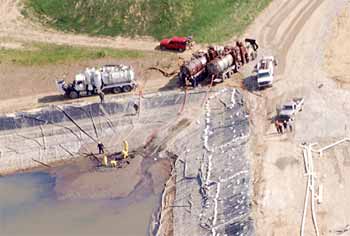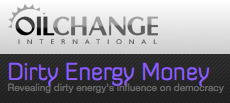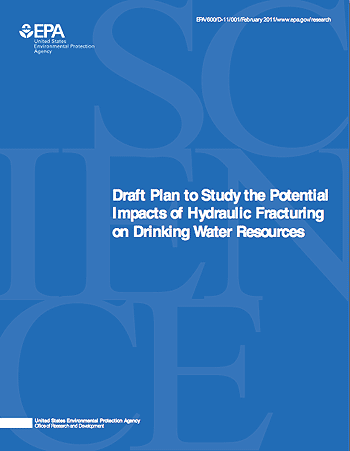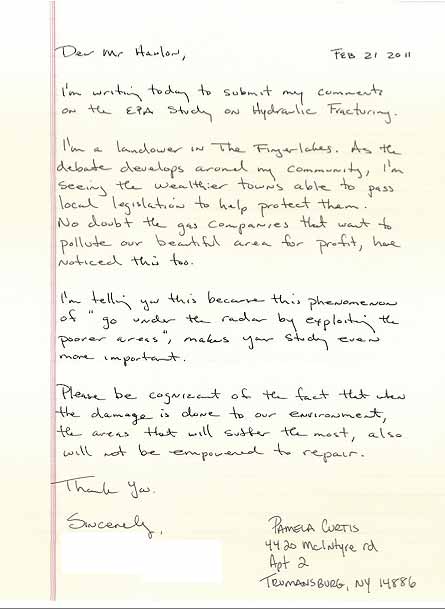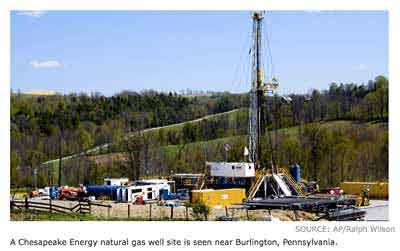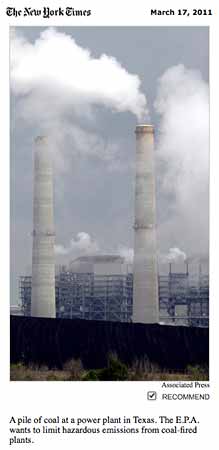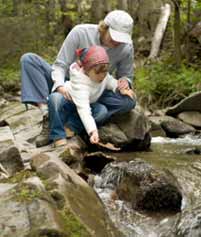Pennsylvania's natural gas drillers are still flushing vast quantities of contaminated wastewater into rivers that supply drinking water, despite major progress by the industry over the past year in curtailing the practice.
Photo: marcellus-shale.us
Under pressure from environmentalists and state officials, energy companies that have been drilling thousands of gas wells in the state's countryside spent part of 2010 overhauling the way they handle the chemically tainted and sometimes radioactive water that gushes from the ground after a drilling technique known as high-volume hydraulic fracturing, or fracking.
Until the second half of last year, Pennsylvania had been the only state to allow most of this wastewater to be discharged into rivers after only partial treatment. Other states required most or all of the brine to be disposed of by injecting it deep underground.
In recent months, though, the industry has boasted big gains in the amount of well wastewater that is reused, rather than trucked to treatment plants that empty into rivers and streams.
See: Articles on Fracking waste water.
See: Pittsburgh’s drinking water is radioactive, thanks to fracking. Only question is, how much?
What the heck am I looking at?
We've created maps of political campaign contributions from companies in the oil & gas and coal industries to congressional representatives. These are relationship map of the contribution network. That means that unlike a physical map, where points are positioned at a geographic location, the icons for the companies and representatives are placed so that they are as close as possible to whomever they contribute to or receive contributions from.
Think of it like a social networking site in which companies and politicians have become 'friends' by giving money.
This site is a project of Oil Change International, developed by Greg Michalec and Skye Bender-deMoll and designed by Diligent Creative. Earlier versions of the site were named 'Follow the Oil Money' and 'Follow the Coal Money'.
 EPA's Draft Hydraulic Fracturing Study Plan
EPA's Draft Hydraulic Fracturing Study Plan
 Science Advisory Board Public Comments Letters from the Public. March 7, 2011. Posted to Web.
Science Advisory Board Public Comments Letters from the Public. March 7, 2011. Posted to Web.
You can read all the form letters submitted from Texas, as well as my letter here:
| Public comment submitted to the SAB Staff Office | Public Comments submitted by Neil Zusman, Ithaca, NY-2-28-11. (PDF, 3 pp., 118,694 bytes) |
"The States have not shown that they can adequately regulate gas drilling, especially in more populated areas. Federal Regulations are clearly needed.
Time and time again, as noted by a Pew Research Group report, a wide variety of industries, in seat belts, lead paint, cigarettes and many others, have fought federal regulation only to have history prove that it never hurt their bottom line." (Neil Zusman, 2011-02-28).
See: Pew Environment Group (PEG) Factsheet: Industry Opposition to Government Regulation (PDF), October 14, 2010.
See: Letter from Thomas Curtis, AWW. Website below:
In summary, AWWA supports protecting of sources of drinking water under any and all circumstances, including hydraulic fracturing. We appreciate the agency’s consideration of our comments. If there are any questions about these comments, please direct them to Alan Roberson, AWWA, at (202) 326-6127.
Yours Sincerely,
Thomas W. Curtis Deputy Executive Director
See this hand-written letter by Pamela Curtis of Trumansburg, New York:
See: Federal Register: Science Advisory Board Staff Office; Notification of a Public Meeting of the Science Advisory Board Panel for the Review of EPA's Hydraulic Fracturing Study Plan. EPA Notice: 2/09/11.
The Environmental Protection Agency (EPA or Agency) Science Advisory Board (SAB) Staff Office announces a public face-to-face meeting of the SAB Panel to conduct an independent review of EPA's Draft Hydraulic Fracturing Study Plan.
The meeting will be held on March 7, 2011 from 9 a.m. to 5 p.m., and March 8, 2011 from 8 a.m. to 5 p.m. (Eastern Time).
The Panel meeting will be held at the Westin Alexandria Hotel located at 400 Courthouse Square, Alexandria, VA 22314.
Members of the public can submit comments for a federal advisory committee to consider as it develops advice for EPA. They should send their comments directly to the Designated Federal Officer for the relevant advisory committee.
Oral Statements: In general, individuals or groups requesting an oral presentation at this public meeting will be limited to five minutes per speaker. Interested parties should contact Mr. Edward Hanlon, DFO, in writing (preferably via e-mail), at the contact information noted above, by February 28, 2011 to be placed on the list of public speakers for the meeting.
Written Statements:
Written statements should be received in the SAB Staff Office by February 28, 2011 so that the information may be made available to the SAB Hydraulic Fracturing Study Plan Review Panel for their consideration.
In its Fiscal Year 2010 budget report, the U.S. House of Representatives Appropriation Conference Committee identified the need for a focused study of this topic. EPA scientists, under this administration and at the direction of Congress, are undertaking a study of this practice to better understand any potential impacts of hydraulic fracturing on drinking water and groundwater. EPA consulted with experts in the field through peer review, and technical workshops and engaged stakeholders in a dialogue about the study through facilitated public meetings.
EPA has submitted its draft study plan on hydraulic fracturing for review to the agency's Science Advisory Board (SAB).
The overall purpose of the study is to understand the relationship between hydraulic fracturing and drinking water resources. The scope of the proposed research includes the full lifespan of water in hydraulic fracturing, from acquisition of the water, through the mixing of chemicals and actual fracturing, to the post-fracturing stage, including the management of flowback and produced water and its ultimate treatment and disposal.
The SAB plans to review the draft plan March 7-8, 2011. Consistent with the operating procedures of the SAB, an opportunity will be provided for stakeholders and the public to provide comments to the SAB during their review. The Agency will revise the study plan in response to the SAB's comments and promptly begin the study. Initial research results are expected by the end of 2012 with a goal for a report in 2014.
See: Industry responds to public take on hydraulic fracturing | Fracking Resource Guide
See: EPA Hydraulic Fracturing Study Plan Review Panel
See: Lisa P. Jackson, EPA (lisapjackson) on Twitter
See: U.S. Congress. Committee on Space, Science, and Technology. "Hearing Highlights Lack of Objectivity in Draft EPA Fracking Study--No Evidence of Drinking Water Contamination from Fracking, Witnesses Say". May 11, 2011
From Magiric, Blog by South African freelance writer, Donald Paul.
Recently, the righteous voices of reason stepped into the fray regarding the use of hydraulic fracturing technology in prospecting for shale gas in the Karoo, One of the voices is journalist Ivo Vegter, who assumed the role of Devil’s advocate. Such a role requires a modicum of intellectual rigour otherwise you end up playing God’s advocate, endorsing that which you supposedly set out to question. It’s an easy back slide and reveals a penchant for controversy over a desire for coherency.
Lewis Pugh, a critic of environmental degradation and a spokesman for Treasure the Karoo Action Group (TKAG), challenged Shell—and other gas and oil companies—about its plan to frack in the Karoo and in so doing made a speech that was widely reprinted and replayed on various digital channels. For some it was rousing. For others, it was “propaganda” and “alarming”. The latter determined that what Pugh was saying was that there would be war over water...
The voices of reason fail to acknowledge the human rights dimension of this debate being more intent of disparaging—but not refuting—the arguments of those opposed to short-term corporate gains at the expense of the future...
The proponents of fracking cannot in any way show that fracking will not contaminate the Karoo aquifers. What they do say, repeatedly, is that there is “no known link” between fracking and aquifer and groundwater pollution. And they cite only their own expert testimony.
...The naivety continues. Vegter cited reams of outdated research regarding “signed statements from state officials representing Ohio, Pennsylvania, New Mexico, Alabama, and Texas, responding to these allegations [water contamination]. As a result of our regulatory review and analysis, the GWPC concluded that state oil and gas regulations are adequately designed to directly protect water resources”.
This is so staggeringly naive it’s unbelievable. It is also shoddy research. These legislators were making a political argument, not a scientific one—in other words, they were covering their backs. The reason why the USA’s Environmental Protection Agency (EPA) is re-opening the debate on the use of hydraulic fracturing—hearings are being conducted as this is being written—is because whistle-blowers within EPA confirmed that political pressure had been brought to bear on the original reports. As Wes Wilson, one of the E.P.A. whistle-blowers, said in a recent interview about that report, five of the seven members of the study’s peer review panel were current or former employees of the oil and gas industry.
Numerous complainants petitioned the USA government to get the EPA to review the earlier decision on hydraulic fracking. One of them, from Neil Zusman, Ithaca, NY, is particularly poignant:
I have read widely on this topic and it is of personal interest to me. I am not a scientist. I observe the events along the historical timeline that includes civil rights, anti-war protest, and the environmental movement....
Donald Paul is a freelance writer from South Africa.
See: Aragom Eloff. Ivo Vegter vs. the Fracking Fringe. 2011-04-18.
See: Julienned DuToit. Fracking the Karoo - The People Say No! 2011-01-31.
See: Lewis Pugh. Frack Off, Shell!. 2011-04-05
See: Robert Brand. South Africa Endorses Plans For Karoo Gas-Drill Freeze, Ending Shell Hopes - Bloomberg. 2011-04-21.
Download this brief (pdf)
A widely used oil-and-gas drilling technique, hydraulic fracturing, is spreading rapidly to develop vast reserves of natural gas trapped in deep underground shale formations.
Hydraulic fracking, however, is coming under more rigorous oversight by the press and state and federal agencies because of its contribution to air and water pollution.
This attention is welcome, both to ensure that health and safety will be protected if gas is to be more widely used as a cleaner replacement for coal in electric plants and foreign oil as a transportation fuel. We must also more accurately measure carbon dioxide and other pollution from the combustion of gas compared to coal and oil.
This issue brief explores the ecological and economic issues of “fracking,” as it is increasingly coming to be known in the areas of the country where natural gas is tapped due to the technology. Cutting to the chase, our conclusion is this—hydraulic fracturing needs to be done carefully and be well-monitored, with particular attention paid to the full scope of carbon dioxide released into our atmosphere to gauge accurately the consequences of global warming due to the expanded use of natural gas.
...Concerns about this technique led late last year to a partial moratorium in New York state on new drilling permits that allow fracking. Nationally, advocates want to repeal a 2005 congressional exemption of fracking from oversight under the Safe Drinking Water Act. Many activists also want to require drilling companies to publicly disclose the chemicals it uses, as other industries do under the Community Right to Know law. Industry historically resists such calls, though a number of companies have recently dropped their opposition, saying they will publicize the chemicals they use.
These natural gas operations also produce smog-forming pollutants, contributing to air pollution problems in places such as western Wyoming and the Fort Worth area. Indeed, natural gas wells produce so much air pollution that smog in the area around Pinedale, Wyoming is sometimes as bad as in Los Angeles. And these shale gas wells can release fugitive methane, which is a potent global warming pollutant.
In a recent investigation, for example, The New York Times reported on rivers and waterways that serve public water systems in Pennsylvania being contaminated with naturally occurring radioactive materials, such as radium, as a result of drilling activities. The series has also raised serious questions about the adequacy of oversight by state and federal agencies including the Environmental Protection Agency.
Tom Kenworthy is a Senior Fellow at the Center for American Progress who focuses on energy and environmental issues. Daniel J. Weiss is a Senior Fellow and Director of Climate Strategy at the Center. Lisbeth Kaufman is a Special Assistant with the Center’s Energy team, and Christina C. DiPasquale is Associate Director of Press Relations at the Center.
WASHINGTON — The Environmental Protection Agency on Wednesday proposed the first national standard for emissions of mercury and other pollutants from coal-burning power plants, a rule that could lead to the early closing of a number of older plants and one that is certain to be challenged by the some utilities and Republicans in Congress...
Lisa P. Jackson, the agency’s administrator, said control of dozens of poisonous substances emitted by power plants was long overdue and would prevent thousands of deaths and tens of thousands of cases of disease a year.
Ms. Jackson pointedly included the head of the American Lung Association and two prominent doctors in her announcement to make the point that the regulations were designed to protect public health and not to penalize the utility industry.
Photograph: Jonathan Ernst/Reuters
Public health advocates said utilities had delayed the rules for more than two decades with court challenges and lobbying campaigns.
“If you think it’s expensive to put a scrubber on a smokestack, you should see how much it costs to treat a child over a lifetime with a birth defect,” said Dr. O. Marion Burton, president of the American Academy of Pediatrics, who stood with Ms. Jackson in announcing the rule.
Oddly, when the story first ran, it included an account of how Ms. Jackson invited a group of second graders from a nearby elementary school to the announcement. Earlier today, Mar. 17, it was edited out. Was it Broder and Rudolf, or the Times? Are children not newsworthy?
"She invited a group of second graders from a nearby elementary school to attend the rule’s unveiling at her agency."
I found a mention of it in a cached Google listing.
Why did the Times delete it? The article as it first appears will always be located here. (PDF). The Google cache will expire as soon as you read this. See for yourself, read between the lines.
(Neil Zusman, 2011-03-17).
Insights and Commentary on Environmental and Energy Issues Worldwide.
Greenberg Traurig, LLP is an international, multidisciplinary law firm with approximately 1800 attorneys and governmental affairs professionals in 32 locations across the United States and in Europe and Asia. The firm was selected as the 2007 USA Law Firm of the Year by Chambers and Partners.
See: David Mandelbaum. December 12, 2010. "Marcellus Shale Update: NY Moratorium Bill Vetoed, NY Executive Order, DRBC Draft Regs, and DRBC Hearing Curtailed."
See: Robert Charrow and Laura Klaus of GT Washington D.C. and David Mandelbaum of GT Philadelphia. Feb 4, 2011. "AEP v. Connecticut: Climate Change as a Public Nuisance".
Economic Implications of Marcellus Shale Natural Gas Development: Potential Impacts on Tourism, Agriculture, and Housing
A webinar hosted by Cornell University's Community and Regional Development Institute (CaRDI) on May 9, 2011 presented the work of a graduate student project in the Dept. of City and Regional Planning guided by Professor Susan Christopherson. Presenters: Vera Bartolome Diaz, Tom Knipe, Christopher Smith, Greg Waldman, Ethan Warsh, David West and Austin Zwick. (PDF version of the Powerpoint).
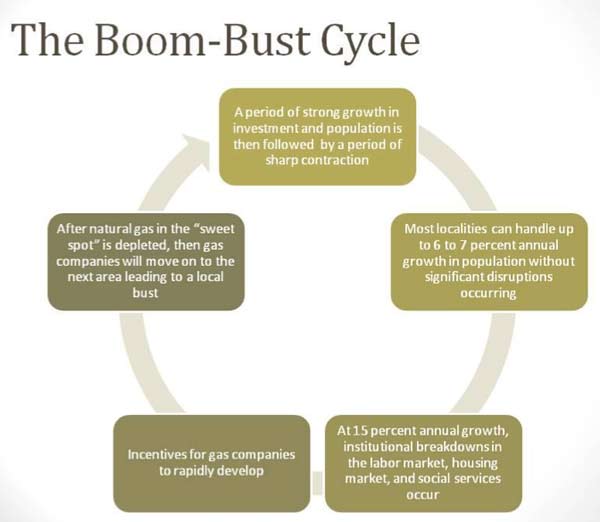
See: Christopherson to study economic impact of gas drilling in Marcellus Shale

Photo by Neil Zusman
Christopherson states that after fracking, there is no other industry. That will be all there is economically for the next ten to twenty years. Forget about agriculture, tourism, wine, tourism, and anything else besides energy. After a decade or two, or more, things might return to normal...
See: Catskill Citizens | More Damning Evidence About Fracking
Lively and informative rural American blog based in Austin Texas. This section contains articles on the Environment.
The Daily Yonder's special reports also bring you overviews of the big issues now facing small communities -- health, employment, broadband access, education, and economic development.
The Daily Yonder brings issues and images of the rural U.S. to the fore. We welcome readers from all over to see what's working, failing or never been tried in small communities.
Dee Davis is president and founder of the Center for Rural Strategies, which publishes the Daily Yonder. He is the former executive producer of Appalshop Films/Headwaters Television. Read more about the staff here.
See: Abrahm Lustgarten. "Natural Gas's Climate Benefits Questioned." Daily Yonder. Jan. 25, 2011.
It was thought natural gas easily beat coal when it came to slowing climate change. The EPA finds that thinking needs a revision.
EIP combines research, reporting, and media outreach to spotlight illegal pollution, expose political intimidation of enforcement staff, and encourage federal and state agencies to take enforcement action to stop these practices. EIP’s work has been cited in Congressional hearings and debates, in reports by the US General Accountability Office, and in frequent news articles.
...no other organization is so sharply focused on the vigilant enforcement of environmental laws.
See: Gasland - The Debate






